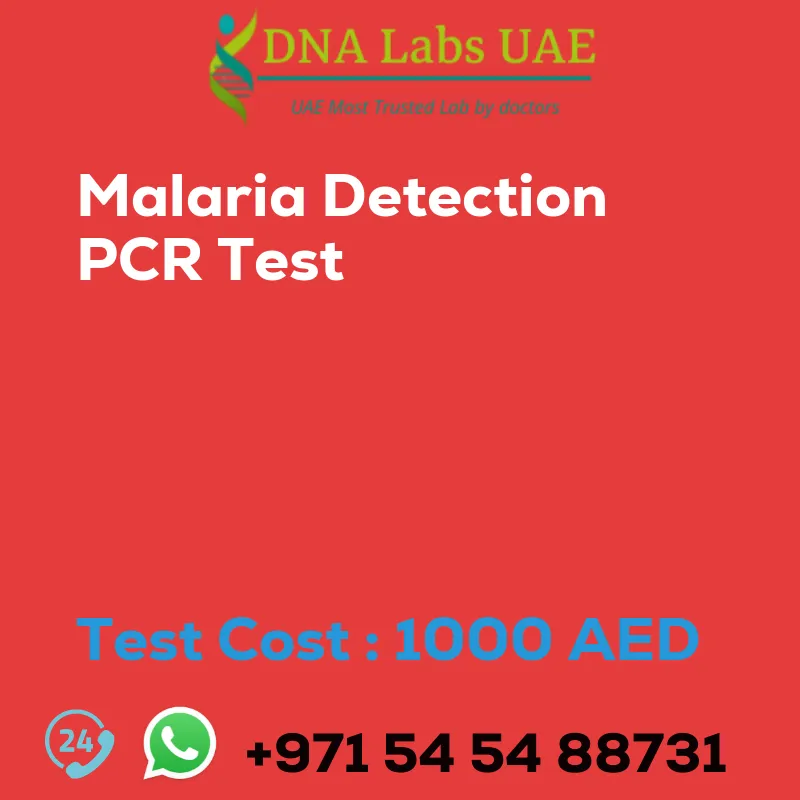MALARIA DETECTION PCR Test
Welcome to DNA Labs UAE, where we offer the MALARIA DETECTION PCR Test. In this blog, we will discuss the cost, symptoms, diagnosis, and test details of this important test.
Test Name: MALARIA DETECTION PCR Test
Components:
- Price: 1000.0 AED
Sample Condition:
4 mL (2 mL min.) whole blood in 1 Lavender top (EDTA) tube. Ship refrigerated. DO NOT FREEZE.
Report Delivery:
Sample Daily by 11 am; Report 6 days
Method:
PCR (Polymerase Chain Reaction)
Test type:
Infections
Doctor:
Physician
Test Department:
MOLECULAR DIAGNOSTICS
Pre Test Information:
No special preparation required
Test Details:
PCR (Polymerase Chain Reaction) is a molecular biology technique used for detecting and amplifying specific DNA sequences. In the case of malaria detection, PCR can be used to identify the presence of the malaria parasite’s DNA in a patient’s blood sample.
To perform a PCR test for malaria detection, the following steps are typically involved:
- Sample collection: A blood sample is collected from the patient suspected of having malaria. This can be done through a finger prick or venous blood draw.
- DNA extraction: The DNA is extracted from the blood sample. This is usually done using a commercial DNA extraction kit or a laboratory protocol that involves breaking open the red blood cells and isolating the DNA.
- PCR setup: The extracted DNA is mixed with specific primers and other reagents in a PCR reaction tube. The primers are designed to target and bind to specific regions of the malaria parasite’s DNA.
- PCR amplification: The PCR reaction tube is placed in a thermal cycler machine, which undergoes a series of temperature cycles. These cycles include denaturation (separation of DNA strands), annealing (binding of primers to target DNA sequences), and extension (amplification of DNA using a DNA polymerase enzyme).
- Gel electrophoresis: After the PCR amplification, the resulting DNA products are analyzed using gel electrophoresis. The amplified DNA fragments are loaded onto an agarose gel and subjected to an electric field, causing the DNA fragments to migrate through the gel. The gel is then stained with a DNA-specific dye, and the presence or absence of malaria DNA bands is visualized under UV light.
- Interpretation: The presence of specific DNA bands corresponding to the malaria parasite indicates a positive result, while the absence of such bands indicates a negative result. PCR tests for malaria detection are highly sensitive and specific, capable of detecting very low levels of the parasite’s DNA. They are particularly useful in cases where the microscopic examination of blood smears may yield inconclusive or false-negative results. PCR can also differentiate between different species of malaria parasites, allowing for accurate species identification.
At DNA Labs UAE, we are dedicated to providing accurate and reliable PCR testing for malaria detection. Our experienced team of professionals ensures that your test is conducted with utmost precision and care. Contact us today to schedule your MALARIA DETECTION PCR Test.
| Test Name | MALARIA DETECTION PCR Test |
|---|---|
| Components | |
| Price | 1000.0 AED |
| Sample Condition | 4 mL (2 mL min.) whole blood in 1 Lavender top (EDTA) tube. Ship refrigerated. DO NOT FREEZE. |
| Report Delivery | Sample Daily by 11 am; Report 6 days |
| Method | PCR |
| Test type | Infections |
| Doctor | Physician |
| Test Department: | MOLECULAR DIAGNOSTICS |
| Pre Test Information | No special preparation required |
| Test Details |
PCR (Polymerase Chain Reaction) is a molecular biology technique used for detecting and amplifying specific DNA sequences. In the case of malaria detection, PCR can be used to identify the presence of the malaria parasite’s DNA in a patient’s blood sample. To perform a PCR test for malaria detection, the following steps are typically involved: 1. Sample collection: A blood sample is collected from the patient suspected of having malaria. This can be done through a finger prick or venous blood draw. 2. DNA extraction: The DNA is extracted from the blood sample. This is usually done using a commercial DNA extraction kit or a laboratory protocol that involves breaking open the red blood cells and isolating the DNA. 3. PCR setup: The extracted DNA is mixed with specific primers and other reagents in a PCR reaction tube. The primers are designed to target and bind to specific regions of the malaria parasite’s DNA. 4. PCR amplification: The PCR reaction tube is placed in a thermal cycler machine, which undergoes a series of temperature cycles. These cycles include denaturation (separation of DNA strands), annealing (binding of primers to target DNA sequences), and extension (amplification of DNA using a DNA polymerase enzyme). 5. Gel electrophoresis: After the PCR amplification, the resulting DNA products are analyzed using gel electrophoresis. The amplified DNA fragments are loaded onto an agarose gel and subjected to an electric field, causing the DNA fragments to migrate through the gel. The gel is then stained with a DNA-specific dye, and the presence or absence of malaria DNA bands is visualized under UV light. 6. Interpretation: The presence of specific DNA bands corresponding to the malaria parasite indicates a positive result, while the absence of such bands indicates a negative result. PCR tests for malaria detection are highly sensitive and specific, capable of detecting very low levels of the parasite’s DNA. They are particularly useful in cases where the microscopic examination of blood smears may yield inconclusive or false-negative results. PCR can also differentiate between different species of malaria parasites, allowing for accurate species identification. |








